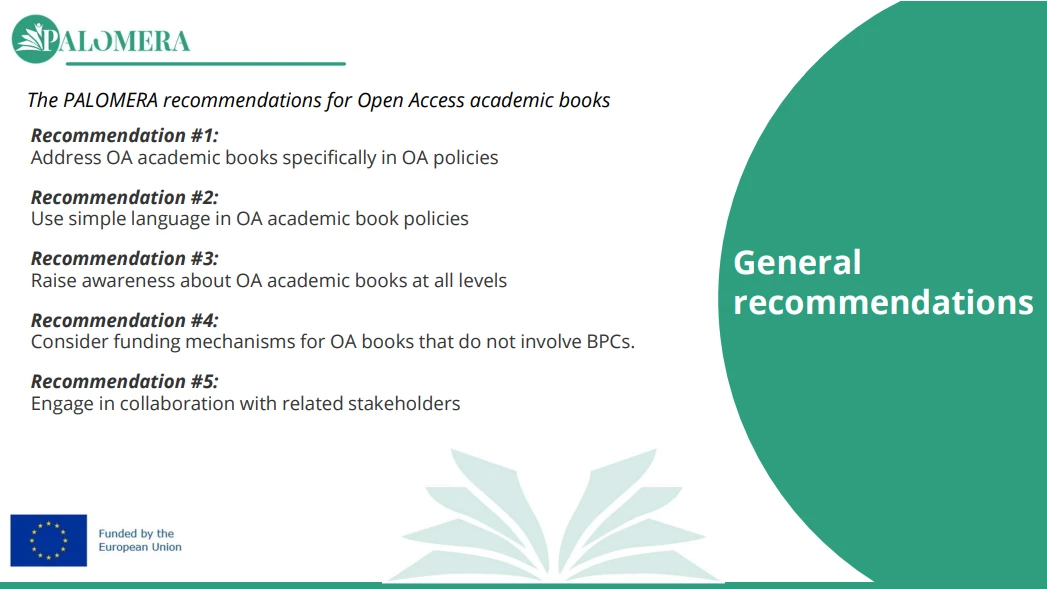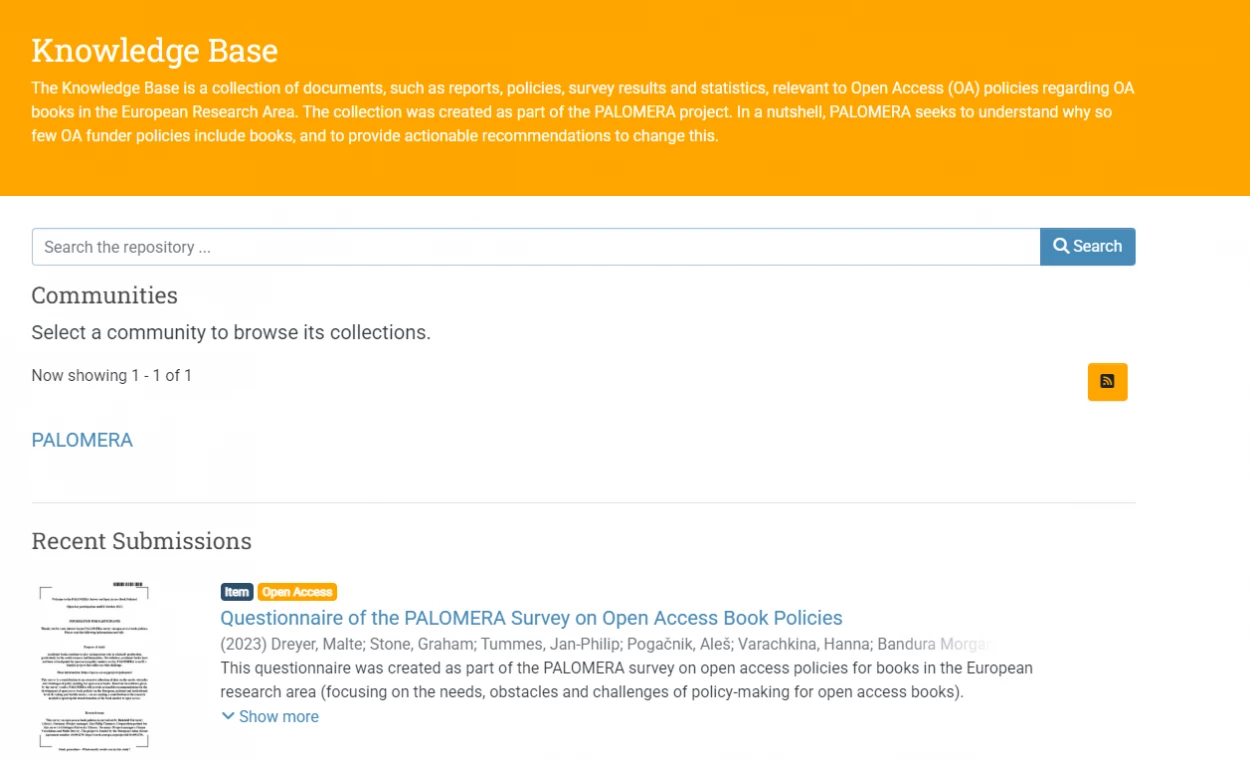Beyond PALOMERA: What will the future of OA book policymaking look like?
Providing evidence-based, actionable recommendations to boost the inclusion of books in Open Access (OA) policies across Europe: this was the ultimate goal of the PALOMERA project, which was completed at the end of 2024. The main results and resources derived from the project, integrated by the UC, are summarised in this article, as well as ideas of what they will represent in the future.
This article is an adapted version of the original final PALOMERA blog post by the Open Access Books Network (OABN). The text was also published on the OPERAS infrastructure blog.
PALOMERA resources and recommendations
The key outcomes from PALOMERA are the Knowledge Base and analysis of its contents, the Funder Forum (which may be renamed as the Policy Forum), and tailored stakeholder recommendations about how different stakeholders can make sustainable progress towards increased levels of equitable OA book publishing and policymaking.
The recommendations
The actionable recommendations provide evidence-based guidance on good practices that can help policymakers build strong policy, but also support other stakeholder groups, including publishers, researchers, infrastructure providers, libraries, and national policymakers, to build a strong and resilient culture of OA book publishing.
The participants in the OABN webinar held on 3 December observed that the recommendations will be particularly helpful because they are simple and segmented, offering guidelines and good practices with an indication of whether they are short-term, medium- or long-term. They enable stakeholders to compare themselves against a quality standard, and it was noted that they would be particularly powerful if they are endorsed and promoted by other organisations working in related areas, for example CoARA, Science Europe, and cOAlition S. Policy may demand compliance, but the recommendations and resources from PALOMERA can also create incentives, motivating OA book publication among publishers, researchers and funders.
The Knowledge Base and analysis
To back the recommendations with evidence, PALOMERA has investigated the status of OA book policymaking in the European Research Area (ERA) through desk studies, surveys, in-depth interviews, and use cases. Over 650 policy and policy-related documents from 39 ERA countries were consulted, as well as 42 anonymised interviews with representatives of different stakeholder books from all corners of Europe. The PALOMERA Knowledge Base is a comprehensive collection of these resources and references. They are tagged, searchable, and excerpted and translated into English where appropriate. This is a resource that can support policymakers as they develop or update OA book policies, and it is all completely open for anyone to browse, explore and use.
PALOMERA has identified many use cases for the Knowledge Base. Focus groups and an ERA-wide stakeholder survey revealed that the most important use cases of the Knowledge Base include gathering evidence, accessing knowledge or resources, advocating for OA books publishing and policy, informing decision-making, identifying and sharing good practices, and finding community, and they make a strong argument for the Knowledge Base’s current and potential future value. The OABN webinar participants observed that the Knowledge Base is extremely helpful for its detail and geographical breadth, but that more work is needed to pull out the common threads across different countries and policymakers, and the missing areas (e.g. metadata) or the contentious areas e.g. licences could be identified. What are the contradictions between policies? And what have the outcomes been?
The Knowledge Base is hosted by the OA Books Toolkit, a publisher-agnostic resource aimed to inform authors and other stakeholders about the process of publishing an OA book. The Toolkit was updated in November 2024 to include ten new articles on funding and policies for OA books, drawn from PALOMERA’s research, in a new ‘Open Access book policies’ section. This has made the Toolkit an even more robust and comprehensive resource on OA books.
The data from the Knowledge Base was analysed in order to gain insights into the current status of OA book policies in the European Research Area. The analysis findings served as the foundation for the project’s recommendations (described above) and offer the most comprehensive study on OA book policies yet. They include not only a structured and detailed analysis of a large and internationally diverse set of policies, but also an examination of the other datasets that were collected in order to understand the circumstances of individual countries and stakeholder groups in detail.
Read the analysis findings here.
The Funder Forum
The Funder Forum is an inclusive and open space where research funders convened during the PALOMERA project to discuss their policy development for OA books, both in the ERA and beyond. Project partners are currently discussing whether there is a scope to rename it as the Policy Forum for OA Books, to clearly signal that its purpose and scope from 2025 is to support all types of OA book policymakers, not only funders.
The OABN webinar participants argued that the Funder Forum is not only important in itself, but can build on and maximise the usefulness of the other key PALOMERA outputs: it can draw out the information within the Knowledge Base, conducting further analysis on the wealth of information it contains to build more robust policies, and it has an important role in promoting the recommendations, checking progress, offering support, and engaging with organisations that are not used to have OA books on their agenda.
What’s next?
At the final webinar in the OABN PALOMERA series in December 3rd 2024, members of the OA books community put their heads together to reflect on where OA book publishing will be in five years’ time, and how policymaking will have contributed to this.
Between more or less optimistic positions on open access publishing, the delay in changing perceptions about this type of publication, and the different roles of editors, the discussion also touched on the topic of the necessary change in research culture. A common point was the realisation of how essential policy-making and funding are. Participants also discussed the role of the OABN in supporting this work.
Thoughts from some project partners
To conclude this journey around the results of the PALOMERA project, the SPARC Europe and DARIAH teams spoke to some of the project members, who shared their thoughts on the far-reaching implications of PALOMERA on video. Check out the full videos in the original post on the OABN blog or on the OPERAS blog.


